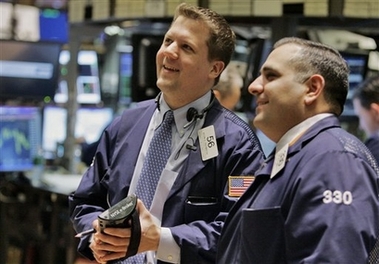Stocks rally on Fed comments on economy
(AP)Updated: 2007-03-22 09:22
NEW YORK - Wall Street rallied sharply Wednesday after an economic assessment by the Federal Reserve ignited investor hopes that the central bank has warmed to the idea of lowering short-term interest rates. Largely thanks to Wednesday's triple-digit gains, the Dow Jones industrials have surged 337 points this week, the best three-day performance for the blue chip average since November 2004.
 Traders Kevin Osowiecki, left, and Kevin Hackett smile as they watch the numbers near the close of trading on the floor of the New York Stock Exchange, Wednesday, March 21, 2007. [AP]  |
The market was also relieved that the central bank left in place language in its statement that it still expects the economy will "continue to expand at a moderate pace."
While a slowdown in the economy likely would quell the threat of inflation and perhaps open the way for a rate cut it would also dent corporate profits.
"I think it did a bit to assuage the equity market's concerns that the Fed understands there is a possibility that the drag on the consumer could bring GDP down below where they expect," said Quincy Krosby, chief investment strategist at The Hartford, referring to gross domestic product - the broadest measure of the economy.
"They made it clear that they remain data-dependent. However, given the data they have today they see an economy that is still expanding, albeit more slowly."
The Dow soared 159.42, or 1.30 percent, to 12,447.52, after having been flat until the Fed announcement. It was the index's biggest one-day point gain since July 24.
Broader stock indicators also posted strong gains. The Standard & Poor's 500 index jumped 24.10, or 1.71 percent, to 1,435.04, and the Nasdaq composite index advanced 47.71, or 1.98 percent, to 2,455.92.
The Dow is still down 0.13 on the year, but the S&P 500 and Nasdaq are now up by more than 1 percent.
Bonds rose following the Fed decision. The yield on the benchmark 10-year Treasury note fell to 4.54 percent from 4.55 percent late Tuesday. The yield on the two-year note briefly fell below that of the 10-year for the first time since August 2006 - a positive sign, given that some say that a market with short-term yields exceeding long-term yields portends a recession.
The dollar was mixed against other major currencies, while gold prices rose.
Light, sweet crude settled up 36 cents at $59.61 per barrel on the New York Mercantile Exchange. A government report showed US crude oil inventories rose again last week, but gasoline stocks fell more than analysts expected.
The Fed's reflections on the economy served as a calming voice on Wall Street after growing unease about economic growth worldwide helped spark a Feb. 27 selloff that saw a 416-point drop in the Dow. The Dow is now 185 points, or 1.5 percent, lower than it was on Feb. 26, before that plunge.
With Wednesday's decision, the Fed has left short-term interest rates, the rate banks charge each other for overnight loans, unchanged for six straight meetings after a string of 17 straight increases that began in 2004.
Though removing the reference to "additional firming" seemed to suggest to some investors that the central bank has softened its stance toward raising rates, analysts pointed out the Fed still noted that "inflation risks remain," and that "recent readings on core inflation have been somewhat elevated."
"By the initial rally it seems like the market is saying the statement is less hawkish and the market is setting up for them to be balanced at the next meeting. Although I believe that they're going toward that direction, I think their statement isn't a clear signal that they're there yet," said Sean Simko, head of fixed income management at SEI Investments.
"They have to remain data-dependent," he said of the
Fed. "If they take their inflation bias off, they risk losing their
credibility."
| 1 | 2 |  |
|
||
|
||
|
|